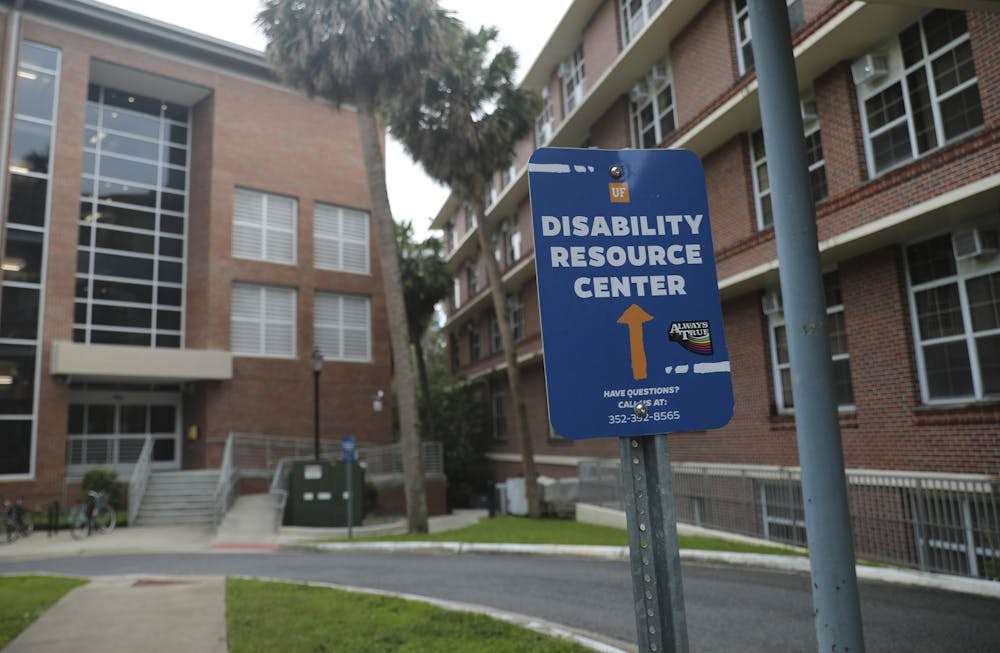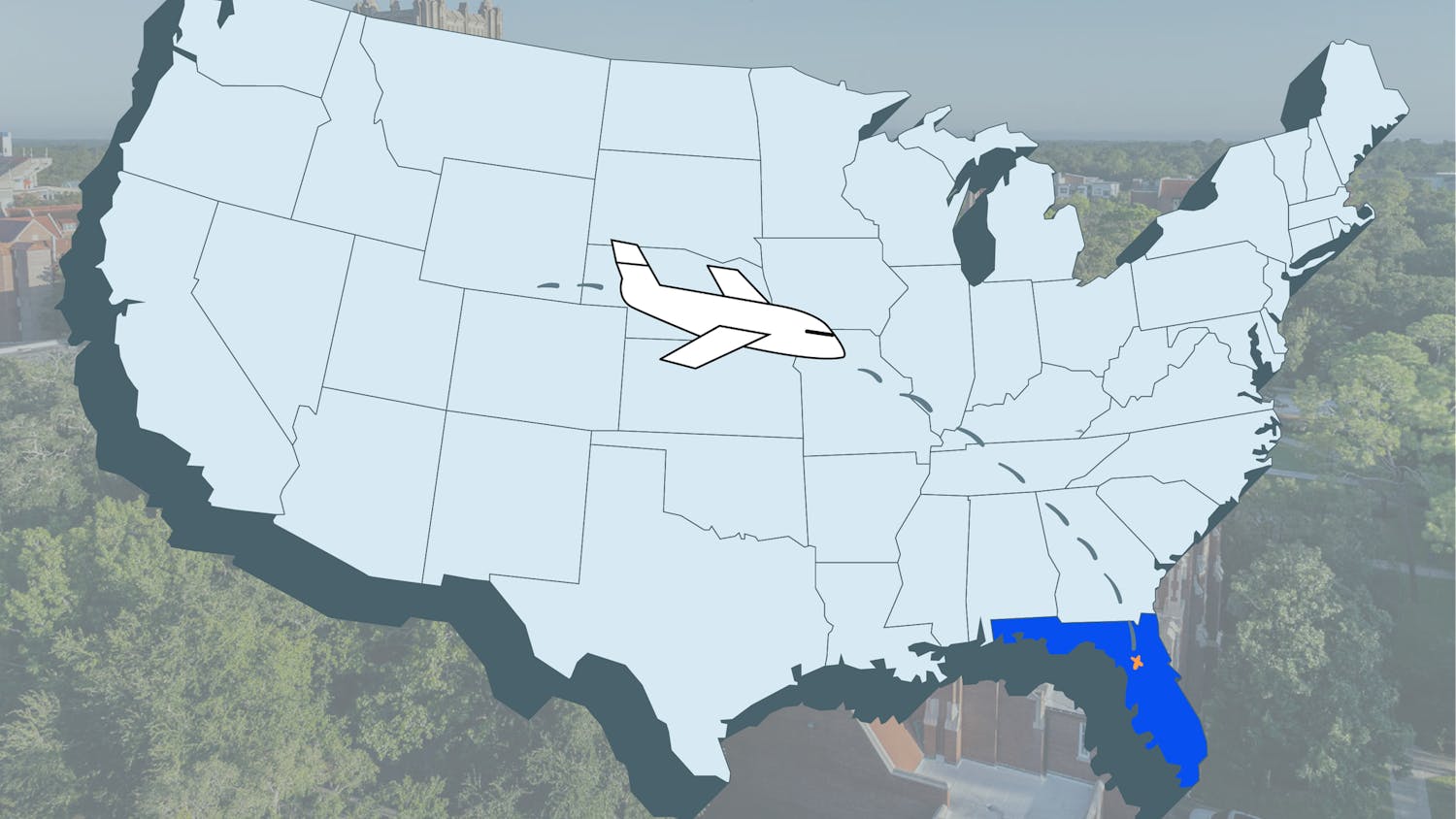Growing up, Devin Norko assumed they were just accident prone when they twisted the same ankle more than 200 times in the span of five years.
For many disabled people, receiving an official diagnosis can be difficult. For Norko, a 22-year-old activist in Virginia, their family, friends and doctors told them their pain was nothing to worry about.
They were not formally diagnosed until college when they discovered they had hypermobility syndrome, fibromyalgia, autism, ADHD and idiopathic intracranial hypertension, which causes high blood pressure in the brain, as well as chronic fatigue, tinnitus and migraines.
July brings the disabled community together to reflect on common experiences and celebrate differences. On July 26, 1990, the Americans with Disabilities Act, which prohibits disability-based discrimination, was passed.
“It’s really only been here for 31 years, and that is sometimes really difficult to conceptualize,” Jenna Gonzalez, UF’s Disability Resource Center interim director, said.
On that day, the city of Boston celebrated Disability Pride Day, and 25 years later, New York declared July as the official Disability Pride Month, and other major cities in the U.S. have held parades in past years to garner support.
Gonzalez said there is still a long way to go for disability rights. Marriage for disabled people often results in the loss of Social Security benefits and health insurance, and ableism still affects the disabled community.
Lindsi Baugher, a 19-year-old UF civil engineering sophomore, experienced ableism throughout her life, which is discrimination in favor of able-bodied and neurotypical individuals.
Baugher said she was adopted at 9 months old and came home sick with ear infections. Her mother found out Baugher was deaf, and she got a cochlear implant, an electronic device that produces a modified sense of sound, at age 2.
Baugher said classmates would make fun of how she spoke growing up, particularly during presentations. She said she would practice in the mirror or around someone she was comfortable with beforehand.
Baugher had her second cochlear implant surgery at UF Health Shands Hospital after starting her first year in college. During the recovery process, she was not able to hear at all for about a month.
In the same way that the ability to walk must be relearned if lost, Baugher said she had to reteach her brain how to hear.
During the COVID-19 pandemic, Baugher used closed captioning for her online classes. As classes move back in person, she will have interpreters to help her, and she said she went to the Disability Resource Center to receive these accommodations.
“They just hired four full-time interpreters, which I'm really excited about because they're trying to expand the DRC community,” she said. “I went up there a couple weeks ago to meet them in person, and they're really cool and chill.”
Gonzalez, the DRC’s interim director, said living with disabilities while transitioning to college can be difficult. She hopes the DRC can act as a support system and make the process easier for disabled students through academic and housing accomodations.
She said there are 4,000 registered students with the DRC, and 60% of these students are registered with mental health diagnoses.
"I hope that I can extend the mission of UF into DRC and extend disability advocacy throughout this campus,” she said.
When Gonzalez was 13, she said she discovered her own invisible disability, a disability that is not immediately apparent, when a teacher pulled her aside during class. She now has a passion for disability activism and has worked at the DRC for four years.
“When I saw the job post for learning specialist, and I read on there about Cypress Hall, I cried,” she said.
She said Cypress Hall, a fully inclusive residence hall where the DRC is located, opened her eyes to what accessibility could mean, and her first day at the DRC felt like home.
“If we can infiltrate one person with Disability Pride Month and at least one person seeing the impact and knowing what disability advocacy means to people, then the month did its job in my eyes,” she said.
Speaking out against ableism is not confined to UF, either. Creators around the world are working to challenge misconceptions about disabilities this month through books, classes and social media platforms.
Andrew Gurza, a 37-year-old disability awareness consultant in Canada, plans to host a virtual class in September to discuss the impacts of ableism. They said they hope to bridge the gap between disabled and nondisabled people in a welcoming environment.
“I would rather use my knowledge, my lived experience, to teach somebody, rather than be angry,” they said. “Of course I'm angry too, but I want to mobilize that and do something good with it, rather than sitting in my own anger.”
Gurza’s advocacy is compiled in their collaborative book and podcast, Disability After Dark, where they shine a light on disabled stories.
“When I say awareness, I don't mean I'm gonna just talk to you about accessibility,” Gurza said. “I mean I'm going to talk about all those things, plus sexuality, plus how does that feel from an emotional level for the disabled person living in that body?”
Gurza lives with spastic quadriplegic cerebral palsy and is a full-time power wheelchair user. They said they hope to see more laws and policies in the future created by and for disabled people.
They said it is often a process to be proud of their disability.
“[Disability Pride Month] means for me, to be proud of being disabled but also recognize there are times when we can talk about how hard it is, and we can talk about how uncomfy being disabled is,” they said. “I love that we can be proud, but being proud doesn’t mean that we can’t talk about the difficult stuff too.”
Many people are using this month to speak up about the injustices they see. Stephannie Bethel, an autistic 26-year-old Tulsa Community College student, said this month is a time for disabled voices to be heard.
She said she took the opportunity to be louder by speaking on the recent reversal of the ban against graduated electronic decelerators by the Food and Drug Administration on July 6.
The skin shock device is held in a backpack and attached to electrodes that deliver a two-second shock to the recipient when a button on the device is pressed. This treatment is meant to promote conformity in disabled people and was banned a year ago. After the Judge Rotenberg Educational Center in Massachusetts filed a lawsuit against the FDA, the decision was overturned, which legalized the device.
“It's appalling to me that it got overturned,” Bethel said.
Other methods that attempt to change disabled people have become common practice, including applied behavior analysis, a type of therapy for neurodiverse people. Izzy Fakkel, an 18-year-old student in England, said applied behavior analysis teaches autistic people to hide themselves, and they lose their sense of identity.
“It's basically therapy where you're punished for being yourself,” she said. “If you talk about your special interests, you're punished. If you stim, you're punished. If you don't make eye contact, you're punished.”
Fakkel said ABA can lead to post-traumatic stress disorder, depression and emotional identity problems, and it uses similar techniques to LGBTQ+ conversion therapy.
“We don't want to be cured either, we want acceptance, and we want people to understand us,” she said. “We don't want to be fixed. In my opinion, there is no normal, so why do we have to hide all our behaviors to seem normal?”
Fakkel said mainstream media reinforces harmful ideas about disabilities, and accurate media comes from listening to disabled voices rather than perpetuating stereotypes.
Social media has given disabled people a platform to spread accurate representation and awareness. Fakkel said she uses Instagram to educate neurotypical people and relate to her neurodiverse followers.
She put together an e-book and workbook for her followers that both provide free resources and coping mechanisms for autistic people. She said she compiled these from notes on her phone and used Canva to design the books.
“A lot of us grow up not having anyone to compare ourselves to who are like us, and we feel really alone, and finding these people, whether that's online or in person, who are autistic is the best feeling ever,” she said. “You finally have that sense of belonging.”
Contact Joelle Wittig at jwittig@alligator.org. Follow him on Twitter @JoelleWittig.






